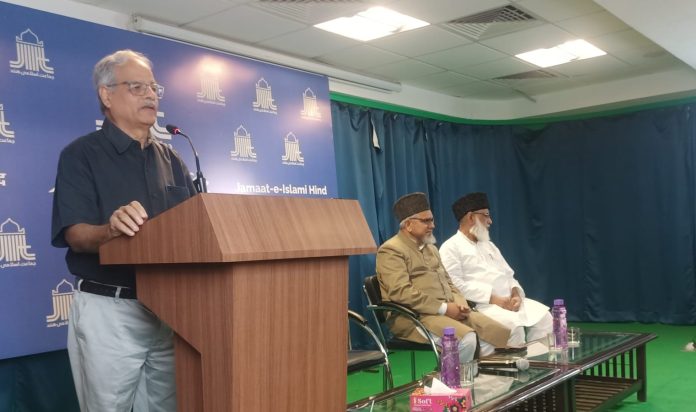9 July 2024: Jaishankar Gupta, a member of Press Council of India, recently emphasized that the greatest threat in the past decade or even century has been to communal harmony. Speaking at a program held at Jamaat-e-Islami Hind headquarters, Gupta reflected on the historical context of communal harmony and its interpretations during the Mughal era, asserting that the Ganga-Jamuni Culture has always been under persistent threat.
Tracing the roots of communal discord, Gupta pointed out that upper castes, feeling threatened by lower castes, sought to create divisions between Hindus and Muslims to maintain their dominance. This tactic was exacerbated by the British, who believed that internal strife would facilitate their rule. “The intolerance we see today is not new; it’s an age-old problem,” Gupta stated.
He elaborated that non-Muslims were systematically indoctrinated to view Muslims as the source of their problems, ignoring the positive contributions of Muslim rulers to Indian society. Simultaneously, Muslims were led to believe that their rule had been replaced by subjugation.
Gupta criticized the role of RSS in fostering Hindu-Muslim divisions and spreading anti-Muslim sentiment. He argued that historical distortions were used to falsely portray Muslim rulers as antagonistic to Hindus. For instance, when Babar fought Rana Sanga, Hasan Khan Mewati sided with Rana Sanga against Babar, demonstrating unity that is often overlooked.
Highlighting the choices made post-partition, Gupta noted that many Muslims opted to stay in India, and their sentiments should be respected. He mentioned Brigadier Usman, who declined an offer to become Pakistan’s army chief, choosing instead to remain in India – a decision for which his family now faces undue scrutiny.
Addressing post-partition violence, Gupta acknowledged that riots occurred even under Congress rule, but claimed today’s environment sees more violence with fewer riots due to Muslim restraint. Unlike past administrations, current leaders openly target and make hate speeches against Muslims, he argued, pointing to inflammatory remarks from both the Prime Minister and state leaders.
Gupta also condemned the media’s role in amplifying anti-Muslim narratives for TRP gains, portraying Muslims as villains. To restore harmony, he advocated for increased social mixing, addressing trust deficits, expanding friendships across communities, respecting religions, and fostering tolerance.
Professor Salim Engineer, Vice President of Jamaat-e-Islami Hind and National Coordinator of Dharmik Jan Morcha, concluded the event by stressing the need for efforts that match the problem’s severity. He noted that significant efforts are being made to restore communal harmony through initiatives like Dharmik Jan Morcha and Sadbhawana Manch across India. According to Engineer, the ongoing attack on communal harmony has weakened the country’s social fabric and constitutional values the most.




